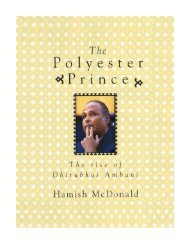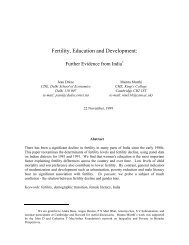Create successful ePaper yourself
Turn your PDF publications into a flip-book with our unique Google optimized e-Paper software.
In October 1977, Reliance had gone public, with a public offer of 2.8 million equity<br />
shares of Rs 10 each at par, taken from the holdings of Dhirubhai and his younger<br />
brother Nathubhai. With its shareholding thus broadened to meet listing<br />
requirements, Reliance was listed on the stock exchanges in Bombay and<br />
Ahmedabad in January 1978.<br />
<strong>The</strong>reafter Reliance expanded its equity base through frequent rights and bonus<br />
issues to shareholders, while financial institutions converted 20 per cent of their<br />
loans into equity in September 1979. But it was through the use of convertible<br />
debentures that Dhirubhai made his big splash in the capital markets. Indeed,<br />
Dhirubhai had anticipated Sen Gupta’s policy with the Series I issue of partially<br />
convertible debentures by Reliance in October 1979, raising Rs 70 million.<br />
Reliance was not alone in trying the long disused instrument promoted by Sen<br />
Gupta. <strong>The</strong> Tata group’s automotive firm Telco raised Rs 230 million with a fully<br />
convertible issue in 1980, followed by the Gujarat Narmada Fertiliser Corp with a Rs<br />
430 million issue. But from late 1980 the issues of partially convertible debentures<br />
came from Reliance in quick succession, raising Rs 108 million in September from its<br />
Series 11 and Rs 240 million from its Series 111 the next year, and Rs 500 million<br />
from Series IV in April 1982. Dhirubhai capped that by obtaining from Sen Gupta<br />
clearance to do what should normally be legally impossible: converting the nonconvertible<br />
portions of the four debenture issues into equity.<br />
By this method, dubbed a ‘brilliant and unconventional move’s by the magazine ‘<strong>The</strong><br />
Economic Scene’s in a September 1984 cover story on Dhirubhai-Reliance was able<br />
to chop Rs 735 million off its debt book in 1983, and turn it into comparatively<br />
modest equity of Rs 103 million, while reserves were raised by Rs 632 million.<br />
Instead of an annual interest bill of Rs 96.5 million on debentures, the dividend<br />
burden from the extra equity was only around Rs 36 million. This transmutation<br />
allowed Reliance to continue raising more quasi-debt, with its E Series of partially<br />
convertible debentures in October 1984 which raised another Rs 800 million.<br />
Sen Gupta denies that he was unduly permissive to Reliance, or that he ever<br />
received any benefits from Dhirubhai such as share allotments. ‘In my first<br />
encounter with him I had to say no,’ Sen Gupta recalled. With the third series of<br />
debentures, Dhirubhai had put in a request that the holders be entitled to renounce<br />
rights attached to their implicit share entitlements. Sen Gupta insisted that the<br />
debentures were not shares until converted.<br />
But Reliance was highly persuasive. On another occasion, Sen Gupta rejected the<br />
premium that Reliance was seeking to put on an issue, on the ground that projected<br />
profitability had not been indicated. Without a pro-forma balance sheet for the<br />
current year an extension of results to date-it could not be accepted.<br />
It was 1 pm that day; Sen Gupta was due to fly that evening to Bombay for a<br />
meeting of his seven-member committee on capital issues the next morning.<br />
Obviously it would be impossible to have the paperwork ready for this meeting. He<br />
told Reliance.<br />
Coming out of the arrivals hall of Bombay Airport at 7 pm, Sen Gupta was met by<br />
accountants from Reliance, and handed a copy of the pro-forma balance sheet and<br />
results for each of the seven committee members. ‘I had no option but to take up<br />
the matter at our meeting,’ Sen Gupta said. .




